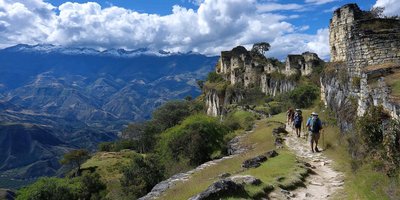
Kuelap Fortress Hike: Complete Guide to Peru's Machu Picchu of the North
Explore the magnificent Kuelap fortress, Peru's most impressive pre-Inca site. Complete guide to hiking, logistics, highlights and cultural significance.
Found 6 results related to this question
Our monitoring service tracks ticket cancellations and new releases 24/7. Get notified instantly when tickets for your preferred dates become available.
Preparing for high altitude conditions is essential when hiking in Peru, especially at iconic sites like Machu Picchu and Cusco, which sit at altitudes of approximately 2,430 meters (7,970 feet) and 3,400 meters (11,152 feet) respectively. Before your trip, it’s wise to acclimatize your body to the elevation by spending a few days in Cusco or the Sacred Valley. This gradual adjustment helps reduce the risk of altitude sickness, which can include symptoms like headaches, fatigue, and nausea.
Staying hydrated is crucial; drink plenty of water and consider herbal teas made from coca leaves, which are traditionally used to alleviate altitude symptoms. Avoid alcohol and heavy meals during your first few days as they can exacerbate the effects of altitude. Snacking on light meals rich in carbohydrates can provide you with the necessary energy for your hikes.
Physical fitness plays a significant role in how well you will adapt to high altitudes. Engaging in cardiovascular exercises before your trip can help improve your stamina. Additionally, when planning your hike, consider choosing less strenuous trails, especially if you are a novice or if it’s your first time at high elevation.
Always listen to your body; if you start feeling unwell, it’s best to descend to a lower altitude and seek medical attention if necessary. Many travelers find it helpful to take altitude sickness medication, such as acetazolamide, but consult a healthcare professional before your trip.
Finally, immerse yourself in the local culture; locals often share tips on how to cope with altitude based on their experiences. Engaging with the community can also offer valuable insights into traditional remedies and practices that might assist in your acclimatization.

Explore the magnificent Kuelap fortress, Peru's most impressive pre-Inca site. Complete guide to hiking, logistics, highlights and cultural significance.

Learn about the health impacts of high altitude travel in Peru, including altitude sickness symptoms, risk factors, prevention strategies, acclimatization guidelines, and tips for safe trekking.

Discover the spectacular Waqrapukara fortress perched on limestone cliffs. Complete hiking guide with routes, difficulty, logistics and cultural insights.

Discover the stunning turquoise waters of Laguna 69 in the Cordillera Blanca. Complete hiking guide with routes, difficulty, logistics and photography tips.

Trek to the famous Rainbow Mountain (Vinicunca) and witness Peru's most colorful natural wonder. Complete guide to routes, altitude, logistics and tips.

Complete guide to altitude sickness at Machu Picchu. Prevention strategies, symptom recognition, treatment options, and acclimatization tips for safe travel.
Set up instant alerts for ticket availability and never miss your chance to visit Machu Picchu.
Get Alerts